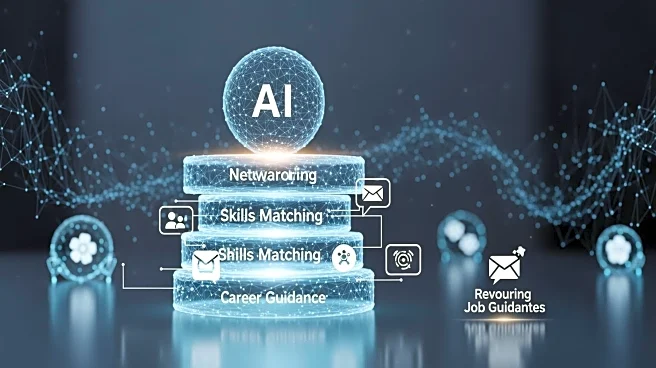What's Happening?
A recent survey conducted by the National Association of Colleges and Employers (NACE) reveals that most students graduating in 2025 are not utilizing artificial intelligence tools in their job search
efforts. Despite employers expressing a desire for candidates with experience in AI tools, the survey, which included data from 1,400 recent graduates, found that only a minority of students are leveraging AI for tasks such as writing cover letters, preparing for interviews, and tailoring resumes. Ethical concerns, lack of expertise, and apprehension about employer reactions are among the reasons cited by students for not using AI. The survey also highlighted that about one in five employers are incorporating AI in their recruiting processes.
Why It's Important?
The findings from the NACE survey underscore a disconnect between employer expectations and student practices regarding AI usage in job searches. As AI becomes increasingly integrated into various industries, students who do not engage with these tools may find themselves at a disadvantage in the competitive job market. Employers seeking candidates with AI proficiency may need to adjust their recruitment strategies or provide training to bridge this gap. Additionally, the ethical concerns and data privacy issues raised by students highlight the need for transparent and responsible AI practices in recruitment processes.
What's Next?
As AI continues to evolve, educational institutions and career centers may need to offer more resources and training to help students effectively utilize AI tools in their job searches. Employers might also consider providing workshops or informational sessions to educate potential candidates on the benefits and ethical use of AI in recruitment. Furthermore, ongoing dialogue between students, educators, and employers could foster a better understanding of AI's role in the job market and address concerns related to data privacy and ethical use.
Beyond the Headlines
The limited use of AI by students in job searches may reflect broader societal concerns about technology's impact on employment and privacy. As AI tools become more prevalent, discussions around ethical use, data security, and the potential for AI to replace human judgment in hiring processes are likely to intensify. This development could lead to new regulations or guidelines to ensure AI is used responsibly and equitably in recruitment.










